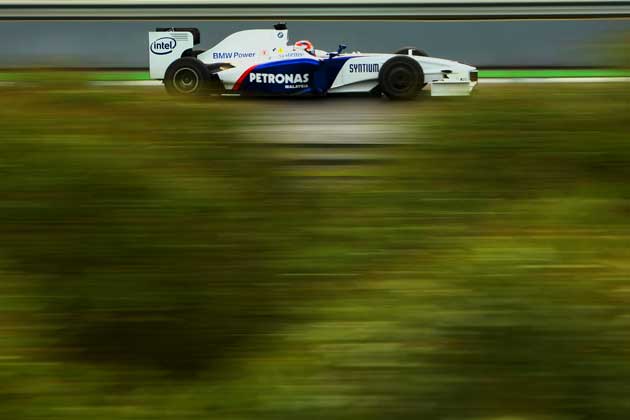Your support helps us to tell the story
From reproductive rights to climate change to Big Tech, The Independent is on the ground when the story is developing. Whether it's investigating the financials of Elon Musk's pro-Trump PAC or producing our latest documentary, 'The A Word', which shines a light on the American women fighting for reproductive rights, we know how important it is to parse out the facts from the messaging.
At such a critical moment in US history, we need reporters on the ground. Your donation allows us to keep sending journalists to speak to both sides of the story.
The Independent is trusted by Americans across the entire political spectrum. And unlike many other quality news outlets, we choose not to lock Americans out of our reporting and analysis with paywalls. We believe quality journalism should be available to everyone, paid for by those who can afford it.
Your support makes all the difference.BMW Sauber has its KERS energy system in place and ready to go for Formula One's season-opening Australian Grand Prix.
Whether the German team uses the hybrid technology in Melbourne, however, is still undecided.
"Now it's just a matter of weighing up the pros and cons," BMW Sauber team principal Mario Theissen said today. "On the positive side, the drivers would have an extra 82 horsepower at their disposal for 6.6 seconds per lap. However, the system adds weight to the car and this has an impact on the car's weight distribution and tire wear.
"We will make a decision on a driver-by-driver, circuit-by-circuit basis."
The Kinetic Energy Recovery System is not mandatory for F1 teams this season, although governing body FIA wants it to be from 2010. It's up to the 10 teams to decide if, and when, they elect to use it in 2009.
BMW Sauber has been one of the champions of the green technology, which stores energy under braking that can be released for overtaking. Theissen said KERS had been a "huge challenge."
"When I look back at how far we have come in such a short space of time, it really is very impressive," Theissen said. "Here, Formula One has taken on the role of technology accelerator for series production cars of the future."
KERS is part of a raft of regulation changes that F1 is integrating in a bid to slash costs amid the global economic downturn. Japanese manufacturer Toyota said over the weekend that it nearly pulled out of the sport shortly after Honda did in December. Honda has returned as Brawn GP.
"Once the cost-cutting measures have taken full effect, I expect further independent teams to come into Formula One and be able to compete on a sound financial footing," Theissen said. "I am in no doubt that Formula One will emerge stronger from the current situation."
American entry USF1 is set to join motor racing's premiere sport from 2010 because of the sweeping changes, which have revealed unparalleled unity among the teams in the sport.
"Today, BMW is spending 40 percent less on its involvement in Formula One than in 2005. From a cost-benefit point of view, Formula One is very positive for us," Theissen said. "I think our sport is heading in the right direction."

Join our commenting forum
Join thought-provoking conversations, follow other Independent readers and see their replies
Comments